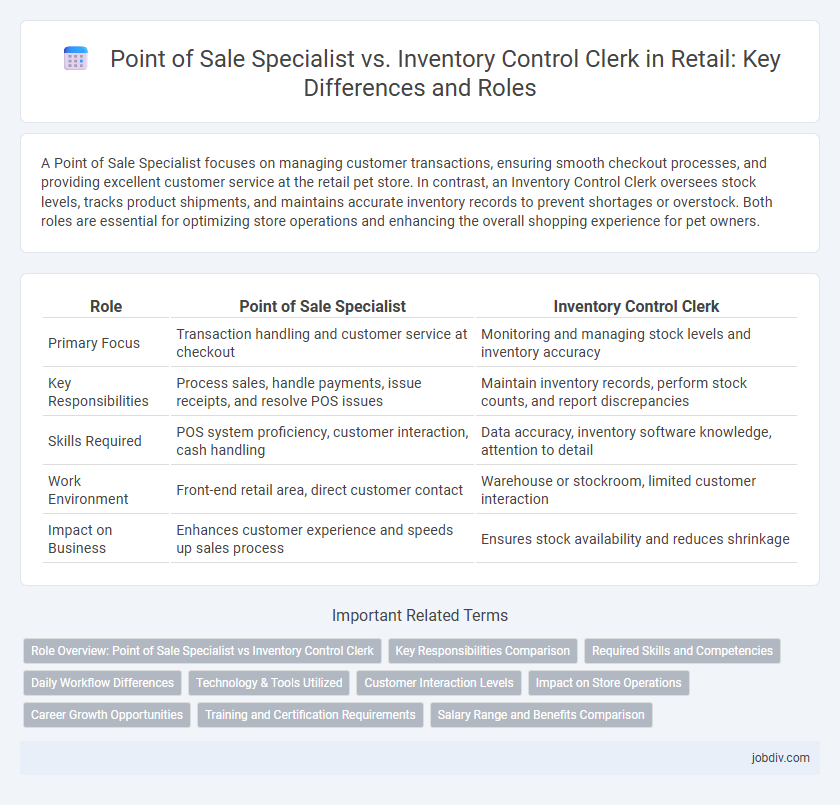A Point of Sale Specialist focuses on managing customer transactions, ensuring smooth checkout processes, and providing excellent customer service at the retail pet store. In contrast, an Inventory Control Clerk oversees stock levels, tracks product shipments, and maintains accurate inventory records to prevent shortages or overstock. Both roles are essential for optimizing store operations and enhancing the overall shopping experience for pet owners.
Table of Comparison
| Role | Point of Sale Specialist | Inventory Control Clerk |
|---|---|---|
| Primary Focus | Transaction handling and customer service at checkout | Monitoring and managing stock levels and inventory accuracy |
| Key Responsibilities | Process sales, handle payments, issue receipts, and resolve POS issues | Maintain inventory records, perform stock counts, and report discrepancies |
| Skills Required | POS system proficiency, customer interaction, cash handling | Data accuracy, inventory software knowledge, attention to detail |
| Work Environment | Front-end retail area, direct customer contact | Warehouse or stockroom, limited customer interaction |
| Impact on Business | Enhances customer experience and speeds up sales process | Ensures stock availability and reduces shrinkage |
Role Overview: Point of Sale Specialist vs Inventory Control Clerk
Point of Sale Specialists manage transaction processing, customer interactions, and payment accuracy at retail checkouts, ensuring seamless sales operations and enhanced customer experience. Inventory Control Clerks focus on tracking stock levels, conducting regular audits, and coordinating with suppliers to maintain accurate inventory records and prevent stock discrepancies. Both roles are essential for operational efficiency, with Point of Sale Specialists prioritizing front-end sales activities and Inventory Control Clerks emphasizing back-end inventory accuracy.
Key Responsibilities Comparison
A Point of Sale Specialist manages transaction processing, customer payment handling, and troubleshooting POS system issues to ensure efficient sales operations. An Inventory Control Clerk is responsible for monitoring stock levels, conducting regular audits, and coordinating with suppliers to maintain optimal inventory accuracy. Both roles are crucial for seamless retail management but focus on different aspects: sales processing versus inventory accuracy.
Required Skills and Competencies
Point of Sale Specialists excel in customer service, cash handling, and proficiency with POS systems, requiring strong communication and multitasking skills to ensure efficient transaction processing. Inventory Control Clerks need expertise in inventory management software, data accuracy, and supply chain coordination, emphasizing attention to detail and analytical abilities to maintain stock levels and reduce discrepancies. Both roles demand organizational skills and knowledge of retail operations, but POS Specialists focus more on customer interaction while Inventory Clerks prioritize inventory accuracy and control.
Daily Workflow Differences
Point of Sale Specialists primarily manage customer transactions, process payments, and resolve point-of-sale system issues, ensuring smooth checkout experiences during peak retail hours. Inventory Control Clerks focus on tracking stock levels, conducting regular audits, and reconciling inventory discrepancies to maintain accurate product availability data. The daily workflow contrast lies in POS Specialists' direct customer interaction and transaction handling versus Inventory Control Clerks' behind-the-scenes inventory accuracy and stock management.
Technology & Tools Utilized
Point of Sale Specialists utilize advanced POS systems integrating barcode scanners, digital payment platforms, and CRM software to ensure efficient transaction processing and customer data management. Inventory Control Clerks rely heavily on inventory management software, RFID technology, and automated replenishment tools to maintain accurate stock levels and streamline supply chain operations. Both roles leverage real-time data analytics and cloud-based solutions to enhance retail operational efficiency and accuracy.
Customer Interaction Levels
Point of Sale Specialists engage directly with customers, handling transactions, addressing inquiries, and enhancing the shopping experience through personalized service. Inventory Control Clerks primarily manage stock levels, conduct audits, and update inventory records with minimal direct customer contact. The customer interaction level for Point of Sale Specialists is significantly higher, making them frontline representatives in retail environments.
Impact on Store Operations
Point of Sale Specialists directly influence store revenue by ensuring smooth and accurate transaction processing, enhancing customer satisfaction and reducing checkout errors. Inventory Control Clerks optimize stock management through precise tracking and auditing, preventing stockouts and overstock situations that disrupt sales flow. Both roles collaboratively sustain operational efficiency, but Point of Sale Specialists primarily drive front-end customer experience while Inventory Control Clerks maintain backend inventory accuracy.
Career Growth Opportunities
Point of Sale Specialists typically advance through roles in customer service management and sales strategy, leveraging expertise in transaction processing and customer engagement. Inventory Control Clerks often move into supply chain management or logistics coordination, emphasizing skills in stock analysis and inventory optimization. Both career paths offer growth by developing specialized knowledge in retail operations and data-driven decision-making.
Training and Certification Requirements
Point of Sale Specialists typically require training in POS system software, customer service, and transaction processing, often supported by certifications like Certified Point of Sale Professional (CPSP). Inventory Control Clerks need specialized training in inventory management systems, data analysis, and stock auditing, with certifications such as Certified Inventory Auditor (CIA) enhancing their qualifications. Both roles benefit from ongoing professional development but differ significantly in technical focus and certification pathways aligned with retail operations.
Salary Range and Benefits Comparison
Point of Sale Specialists typically earn between $28,000 and $42,000 annually, with benefits including commission opportunities and customer service bonuses. Inventory Control Clerks have a salary range of $30,000 to $45,000, often receiving benefits such as health insurance, paid time off, and retirement plans. Salary variations depend on experience, geographic location, and company size within the retail sector.
Point of Sale Specialist vs Inventory Control Clerk Infographic

 jobdiv.com
jobdiv.com